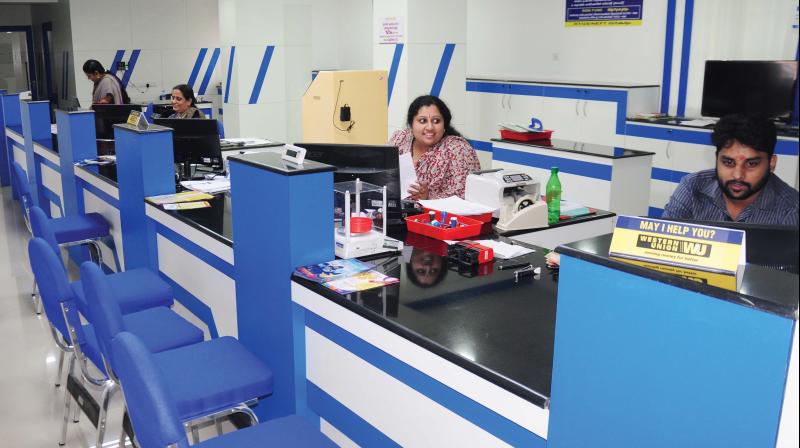Money politicking: Battle for co-operative banks

THIRUVANATHAPURAM: The BJP's campaign against the primary co-operative banking sector in Kerala alleging that it is a safe haven for hoarding black money has set the stage for a major political fight between the Centre and state. A majority of the co-operative sector banks in Kerala are controlled by the CPM, hence the Marxists see a devious move to destroy the co-operative sector. By banning exchange of demonetised notes in District Co-operative Banks (DCBs), the Centre has pushed the co-operative banks into deep crisis, they say. "The Centre showed consideration to private banks following demonetisation but none to co-operative banks which cater to the poor, rural population and daily wage earners," lamented Co-operation Minister A.C. Moideen. He has personally spoken to all MPs from Kerala to raise the issue in the Parliament session that begins tomorrow.
On the political front CPM is gearing up for long drawn battle with Centre. The co-operative sector in the state will remain shut on Wednesday as mark of protest. In a way for the CPM, the RBI directive to stop district co-operative banks from accepting the demonetised notes could not have come at a better time. "We are going to rally lakhs of people who are connected with the co-operative sector to oppose the Centre's move which is aimed at helping new generation banks. If the there is any problem related to Income Tax it should be sorted out as per norms. But putting the poor people in such great difficulty is unacceptable," says CPM state Secretary Kodiyeri Balakrishnan.
While the RBI directive is applicable to co-operative societies across the country, the CPM has raised the pitch in Kerala because of the political campaign unleashed by the state BJP accusing the CPM of stashing black money. The CPM alleges that the BJP which has no presence in the state's co-operative sector, wants to weaken the Left influence. The co-operative sector which holds more than Rs 60,000 crore deposits and has disbursed more than Rs 30,000 crore in loans, plays a crucial role in state's economy especially in the semi urban and rural areas covering 1.5 crore customers.
The biggest criticism against co-operative banks is that many of them don't strictly adhere to KYC (Know Your Customer) norms. They don't insist on knowing the source of income, TDS is not filed, PAN card is not sought which makes it difficult for the Income Tax department to record the transactions. It is also alleged that the presence of high-level of debts among rural population, a section which is catered to by these banks, also suggest that the benefits were not reaching the most deserving people. It is in this context that the co-operative banks have been accused of stashing large sums of unaccounted money.
However, Kerala State Co-operative Bank president Kurien Joy refutes these allegations. "The RBI decision had led to a big crisis in the sector. District Co-operative Banks possesses RBI banking license and the action is unjustified," he said. Not only CPM but even the BJP leaders in Gujarat have threatened to launch an agitation against RBI directive. Porbandar MP Vitthal Radadiya of BJP has charged that poor rural people had been deprived of their rights because of this illogical decision. He has shot off letters to Gujarat CM and BJP president Amit Shah demanding the rollback of the decision.
"If they fail to resolve the issue, the farmers and poor people will be forced to launch a massive agitation. The government will have to bear the consequences," he said. With the decision adversely affecting co-operative sector across the country, another BJP leader Dilip Sanghani, who heads the National Federation of Co-operative Banks (NAF-SCOB), has sought the intervention of Union Minister of state for finance Santosh Kumar Gangwar.
Leaders of mass movement have also joined the protest brigade. Hardik Patel, famous for his protest to get reservation for Patels, is planning a massive stir against the RBI directive which according to him will break the spine of rural economy. In Kerala, many fear that co-operative sector crisis will further push people into the trap of money lenders and "blade mafia". Two years ago, the then home minister Ramesh Chennithala had made a startling revelation that the 'blade mafia' in the state was doing business worth Rs 2,000 crore every month. These people functioned outside the RBI frame work and charged extremely high interest rates besides indulging in extortion and strong arm tactics.
CPM sources said that LDF government was committed to strengthen the co-operative sector. It has already constituted a committee to look into the possibilities of merging district and state level co-operative banks to form a single bank. This decision clearly indicates that the party led government has nothing to hide in co-operative sector, they said. Once the proposed bank comes into being, it would have the highest number of branches in the state and it could also contribute significantly to meet Kerala's development challenges in various sectors. But for the moment, the state government will have to put the merger issue in the back burner and focus on safeguarding the interests of co-operative bank customers.

